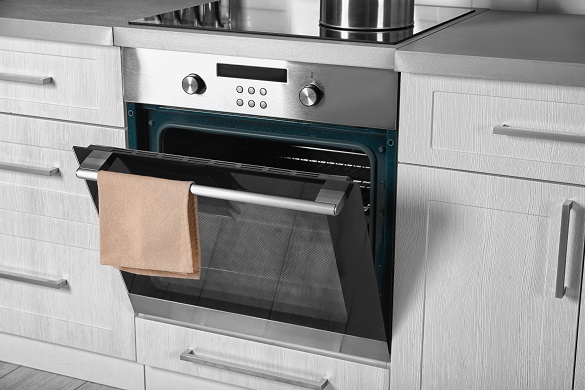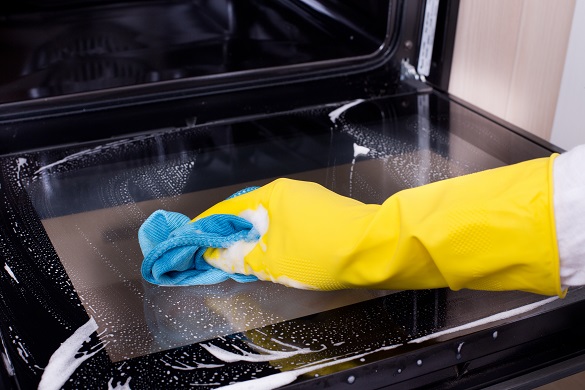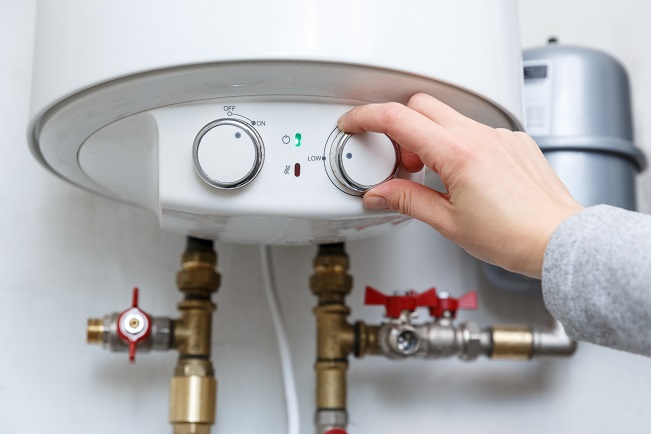One of the key questions to ask when looking for a new oven is, ‘Should I get gas or electric?’ In reality each has its pros and cons, so we can’t say that one is always better. The answer to the ‘gas or electric’ oven question all depends on your kitchen, your cooking style and your preferences.
Here we’ll cover how the types of oven work, how they differ and what to consider when choosing one. By the end, you’ll have a good idea of what to look for in the oven of your dreams.
How electric ovens work

Much like an electric radiator, an electric oven creates heat from electricity. Inside the oven is an element which gets hot when electricity flows through it. When you select a cooking temperature, sensors in the oven maintain that temperature by turning the heat on or off.
Many electric ovens have a fan which moves heat around the oven space. This creates a more even heat and helps speed up cooking times.
Unlike gas ovens, electric ovens don’t burn fuel. This means electric ovens often have a steadier temperature than gas, because of the solid heating element. It also means that electric ovens tend to take longer to heat up than gas, though.
How gas ovens work
Gas ovens create heat by burning natural gas, similar to how a gas boiler works. When you turn the oven on, gas flows in and a small flame or spark sets it alight. There’s usually a metal grille between the burning gas and the space where you cook your food.
Modern ovens ignite the gas automatically, while on older ovens you would light the gas with a match. When you raise or lower the temperature dial on the oven, it simply lets in more or less gas to burn.
Gas ovens heat up faster than electric ovens, but they can be less predictable. The temperature in gas ovens tends to be less steady and can vary in different parts of the oven.
Comparing electric versus gas ovens
When comparing electric versus gas ovens, there are a few key aspects:
- The setup of your kitchen
- Any particular dishes you want to cook
- The cost of electricity and gas
- Maintenance and repair costs
If you live in an area without a natural gas supply, of course that will narrow your options. Or if your kitchen doesn’t have a gas connection set up, you’ll have to factor in the cost of getting one installed.
Cooking performance
Gas versus electric cooking styles
Gas ovens produce a more humid heat, while electric ovens are drier. For this reason, some people prefer gas ovens for bread and pies, because the crusts tend not to dry out and harden. On the other hand, electric ovens may be better for cakes because the heat is more even.
Some electric ovens let you use different functions at the same time. For example, you could cook a thicker piece of meat with the grill and the fan at the same time. Or you could thoroughly cook a pizza top and base by using the bottom heating element and the fan.
How fast the oven heats up
Because gas ovens burn fuel instantly, they heat up faster than the element in an electric oven. While a gas oven might take 10 minutes to heat up fully, an electric oven can take 20 minutes.
Distribution of heat in the oven
Gas ovens don’t have fans moving the heat around, so they’re hotter at the top and cooler at the bottom. This can be useful if you want to cook different things at the same time. On the other hand, an electric oven might be easier if you want to cook large batches evenly.
Energy efficiency
Based on the ovens popular in the UK today, these are the average energy consumption figures:
From this, we can see that electric ovens are more energy efficient. That doesn’t mean they’re cheaper to run, though.
The low price of gas means that electric ovens are still the more expensive option. Having said that, the difference isn't huge — you might spend around £50 more per year with an electric oven.
Maintenance and repairs

Unless you’re very relaxed about kitchen hygiene, you’ll want to clean your oven regularly. On top of that, most appliances will need fixing at some point in their lives. So, the final aspects to consider when choosing your oven are how easy it is to clean and repair.
Firstly, gas cooking comes with more risks than electricity. You need a qualified professional to install or repair any gas appliance, including gas ovens. Before getting any work done, you’ll have to check the engineer is Gas Safe registered.
If you’re concerned about your oven breaking down, you can take a look at oven protection.
In terms of cleaning, there isn’t much difference between electric and gas ovens. When cleaning a gas oven, you should be careful not to squirt fluid where the gas comes out. It’s also best not to put chemicals directly on the heating element in an electric oven, as it can smell bad and potentially damage the element.
Which type of oven is best for you?
As we’ve seen, we can’t say for sure that a gas or electric oven is better. If you want a more stable heat and care about energy efficiency, then an electric oven might suit you. If you want an oven that heats up faster and is a bit cheaper to run, then you might prefer gas.
Oven technology is developing all the time, with new cooking methods and greater energy efficiency. To start off, we recommend checking out the popular ovens in your price range and comparing the features they offer.
Our blog is loaded with more related articles

Oven tips
How to use an oven: a step-by-step guide
Getting your oven settings right is crucial for cooking food safely and taking care of your appliance. Get some tips from our g...
Read more

Oven tips
How to clean your oven
Discover how to clean your oven effectively and safely with this step-by-step guide. Get helpful tips on cleaning materials to...
Read more

Boiler help and advice
The 3 types of boiler you need to know about
If you’re looking to learn exactly what a combi boiler is and how it differs from other types, read our guide on combi vs...
Read more
